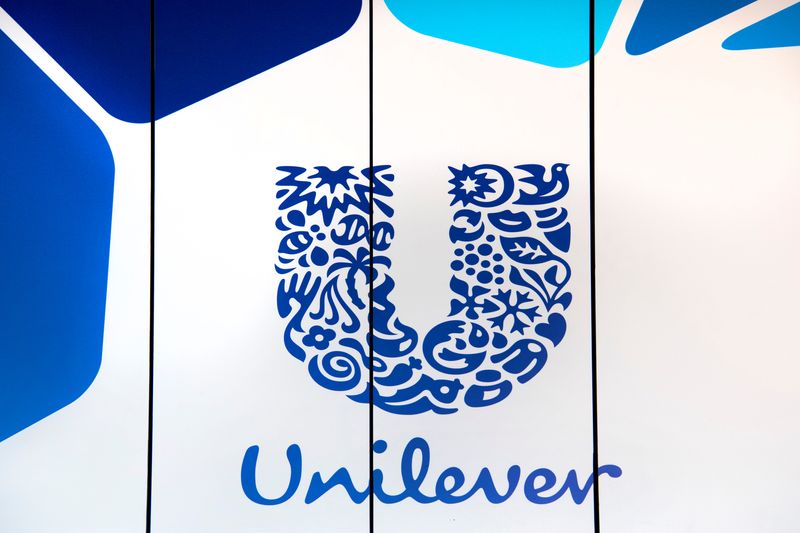By Richa Naidu
LONDON (Reuters) - Unilever (LON:ULVR), the maker of Dove soap and Ben & Jerry's ice cream, struggled to defend fourth-quarter grocery store market share across most of its categories in Europe and the United States, data shows, as it ceded some of its turf to private labels and cut products.
The food and consumer products industry has increased prices sharply on basic goods in recent years to make up for soaring input costs that began with the pandemic and were exacerbated by Russia's invasion of Ukraine.
These hikes prompted a cost of living crisis in Europe and the United States, and eventually pushed shoppers towards cheaper private label brands owned by retailers like Carrefour (EPA:CARR), Tesco (OTC:TSCDY) and Walmart (NYSE:WMT).
Unilever's underlying price growth was 13.3% at its height in the fourth quarter of 2022, with prices at its home care business up nearly 17% and prices at its ice cream business about 14% higher in that period.
Price hikes are easing, however, and Unilever, which owns the Magnum and Persil brands, increased prices by only 5.8% in the third quarter of 2023, Nielsen data showed.
P&G, Unilever's biggest rival in the household and personal care category, on Tuesday cut its annual profit forecast on slowing price hikes. Unilever reports full-year earnings on Feb. 8.
Investors and analysts, who warned that the prolonged hikes could alienate shoppers in the long term, have called out Unilever's shrinking market share for several quarters, raising concerns over growing private label brands on conference calls.
From ice cream to mayonnaise and laundry detergent, Unilever lost market share in the quarter, the data showed. In Europe, the company's share of the ice cream category declined by 141 basis points in the month to Dec. 3, while mayonnaise declined by 374 basis points.
Overall, Unilever's European market share in food fell by 160 basis points, while market share in household and personal goods fell by 52 basis points.
In the United States, Unilever's body wash business, which includes Dove products, lost the most market share - down 510 basis points - while deodorant brands such as Axe fell 310 basis points in the month to Dec. 2, Nielsen data showed. Household and personal goods in the U.S. fell 245 basis points, while food fell only 20 basis points.
Unilever did not respond to a request for comment.
PRIVATE LABELS ON THE RISE
Nielsen data, much of which is gleaned from check out registers at grocery stores, does not capture all retail channels.
The data, reviewed by Reuters, doesn't specify which companies gained share, but private label food sales increased 16% in the two years to March 2022 alone, reaching $135.5 billion at the time, according to separate NielsenIQ figures.
Retailers with big private label brands have been busy innovating and marketing since big consumer companies started raising prices, particularly in Europe where they have been powerful for decades.
Unilever, like others in the industry, has also lost market share because it has been cutting down on the variety of products it makes, particularly in ice cream, using artificial intelligence and other tools to help it decide which products to drop.
Companies have been doing so in order to focus innovation and marketing on what they consider key brands. In Unilever's case, these are 14 key "billion-euro brands," including Dove.
When asked during a recent conference call about how Unilever could regain market share from private label brands and other competitors, Unilever chief executive Hein Schumacher said: "We're not in the game of just simply stealing share. For us, priority number one is to make the market and, therefore, to develop the market and enlarge the categories."
In an earnings call in October, Barclays analyst Warren Ackerman said Unilever's market share of 38% was "not good enough" and that Unilever needed to be "close to 60%, to be top quartile in staples".

Aviva (LON:AV) fund manager Richard Saldanha said Unilever needs to address categories where it is experiencing weaker growth.
"Schumacher has highlighted that winning market share is an area where they are focused on delivering improvement," he said. "This will inevitably take time in terms of turning this around, so investor patience is certainly required."